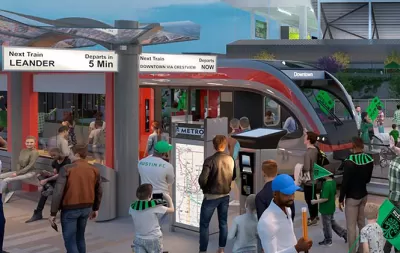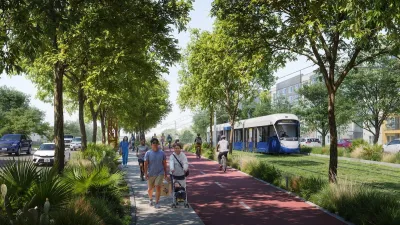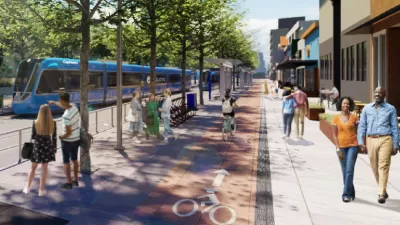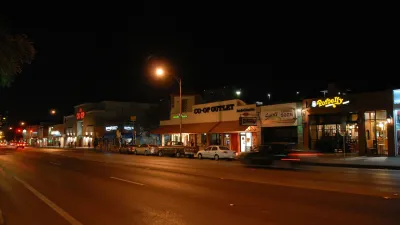The massive transit project’s unique funding scheme could run afoul of state law.

Austin’s Project Connect could be in jeopardy after Texas Attorney General Ken Paxton issued an opinion stating that the project’s “unique financing model is likely illegal,” setting off concerns among supporters of the potentially transformative $7 billion transit investment.
Ryan Autullo outlines the situation in Austin American-Statesman, writing: “Voters approved two things that are at issue in Paxton's opinion: a 20% increase in the city portion of their property tax, and the establishment of a local government corporation to build the system, financed by debt backed by that tax revenue. That tax revenue transfer, according to a city resolution, is to continue indefinitely until funds are no longer required for ‘operations, maintenance, or state of good repair.’”
According to Autullo, “The opinion says Austin is not authorized to pay down debt with the increased maintenance and operation taxes. It also says the tax revenue, about $160 million a year, cannot be transferred to the local government corporation in perpetuity without the ability to terminate at the end of each budget period.” The opinion comes alongside proposed legislation that would require Texans to vote on Project Connect again because the first proposal did not include an approval of new debt.
The city has few options to save Project Connect. “The city could hold a bond election to fund the project, but that would be tricky as the light rail cost is fluid and city leaders would largely be guessing on the amount they'd ask voters to approve.” The city could also use a municipal bond, which “might also spell financial trouble for the city.”
FULL STORY: Ken Paxton raises legal concerns on Austin's financial model for Project Connect

Planetizen Federal Action Tracker
A weekly monitor of how Trump’s orders and actions are impacting planners and planning in America.

Restaurant Patios Were a Pandemic Win — Why Were They so Hard to Keep?
Social distancing requirements and changes in travel patterns prompted cities to pilot new uses for street and sidewalk space. Then it got complicated.

Maui's Vacation Rental Debate Turns Ugly
Verbal attacks, misinformation campaigns and fistfights plague a high-stakes debate to convert thousands of vacation rentals into long-term housing.

In California Battle of Housing vs. Environment, Housing Just Won
A new state law significantly limits the power of CEQA, an environmental review law that served as a powerful tool for blocking new development.

Boulder Eliminates Parking Minimums Citywide
Officials estimate the cost of building a single underground parking space at up to $100,000.

Orange County, Florida Adopts Largest US “Sprawl Repair” Code
The ‘Orange Code’ seeks to rectify decades of sprawl-inducing, car-oriented development.
Urban Design for Planners 1: Software Tools
This six-course series explores essential urban design concepts using open source software and equips planners with the tools they need to participate fully in the urban design process.
Planning for Universal Design
Learn the tools for implementing Universal Design in planning regulations.
Heyer Gruel & Associates PA
JM Goldson LLC
Custer County Colorado
City of Camden Redevelopment Agency
City of Astoria
Transportation Research & Education Center (TREC) at Portland State University
Jefferson Parish Government
Camden Redevelopment Agency
City of Claremont





























